|
One of the most common questions I've been asked most about Power of Attorney (POA) is, what if I don't have a POA and I become incapable of making decisions for myself? My answer is - you're going to create a lot of trouble for your family or whoever needs to help you to manage your affairs.
When an adult needs help managing their affairs because of mental incapability due to an illness, accident, disability or diseases associated with aging, their judgment may be impaired in some way. They may forget to pay bills or put money away and forget where it is. The adult may also be confused about banking, investments, property, and personal belongings. However, they may have planned ahead and authorized someone else to make decisions and managing their financial and legal affairs through an enduring power of attorney. But what if the adult does not have a POA? This question has been asked numerous times. And my answer is – it depends on your purpose.
Most parents, as they get older, would want to add their adult children on title of their home to save on probate fee when they pass. Yes, although it is true that you can “save” on probate fee, but it can cost you more financially and have significant legal impact down the road. Most people’s resolutions would include losing weight, exercising regularly, eating healthier so on and so forth. Have you considered getting your estate and personal planning documents in order as this year’s resolution?
Wills, Powers of Attorney and Representation Agreements are the most common and are probably one of the most important documents in your estate plan. Accidents can happen without any forewarning. In the direst circumstances, if you pass away without a will, basically you are leaving up to the law to determine how you want your estate to be distributed upon your death. Your family or closest friends, while grieving for their recent loss, are also required to apply to the Court to be the administrator of your will. In other instances, you suffer sever injury or illness and are not able to communicate with anyone, who’s going to handle your financial, legal, or personal care matters? Your family, even your spouse, would not be legally to handle your matters. |
welcomeA bit about myself. I am a member of the British Columbia Notaries Public Society. I want to answer some of the most common questions that my clients have through my blog. Hope you find it useful. Archives
April 2019
Categories
All
|
Talk to us today!
HoursMon - Fri: 9:30am to 5:30pm By Appointment Only
Sat: Closed By Appointment Only Sun: Closed |
Email
|
Call
Tel: 604-266-6644 (Eng, 中)
Fax: 604-266-6614 |
Social
|
Copyright © 2019 Jerome Tsang Notary Public | Notary Public, Vancouver BC Notary | Sitemap




 RSS Feed
RSS Feed
